School of Dentistry opens state-of-the-art technology center for students
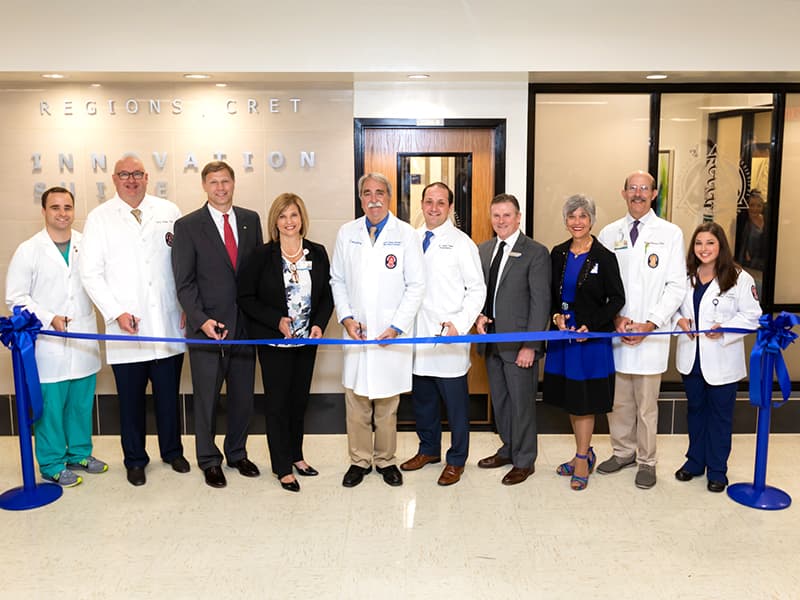
The School of Dentistry at the University of Mississippi Medical Center is one of only four schools in the nation with a technology center featuring the latest and best dental equipment for student training funded by a national organization established to do just that.
The school was chosen in 2017 by the Center for Research & Education in Technology, Inc. to host the Regions CRET Innovation Suite, a high-tech clinic featuring six state-of-the-art dental treatment rooms and two dental hygiene treatment rooms with equipment donated by more than 26 different dental manufacturers.
“This is the future of dentistry. All the students – as I look around, you are the future of our industry and of dental health care,” said Don Hobbs, vice president of equipment sales at Henry Schein, Inc. and CEO of CRET, at the grand opening ceremony for the clinic Friday. “It’s really important you get the chance to use the equipment. It’s really important.”
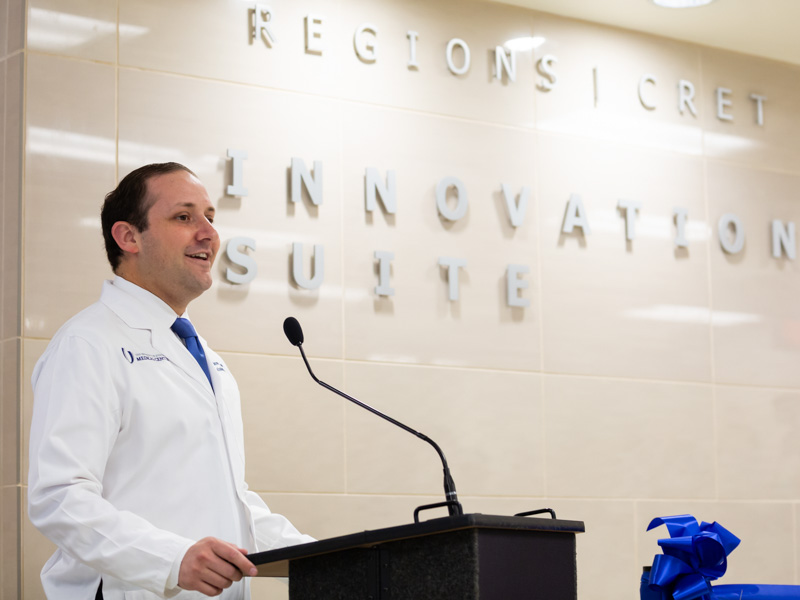
Regions provided $100,000 for renovations to the area on the second floor of the school’s building.
John Boydstun, Regions commercial relationship manager and senior vice president, said Regions saw the value for the community in supporting the Innovation Suite.
“These products and equipment are hitting the private dental practice as soon as they go into the marketplace, so it creates a challenge for dental school graduates to not be fully exposed to the technology that’s out there today,” Boydstun said. “With the Regions CRET Innovation Suite, the School of Dentistry is going to have that advantage. It gives the school a very unique offering that differentiates itself on a national level.”
Dr. David Felton, dean of the School of Dentistry, has been working the past three years to bring the center to fruition.
“This clinic is truly the shining star in the School of Dentistry, and will enable us to train the next generation of dentists for Mississippi with cutting-edge technologies,” said Felton.
The clinic, which is designed to simulate a private practice dental office, also includes an innovative new sterilization center, two cone beam computerized X-ray machines, digital dental impression capabilities, 3-D printers, a laser room and the capability to design and mill dental prostheses.
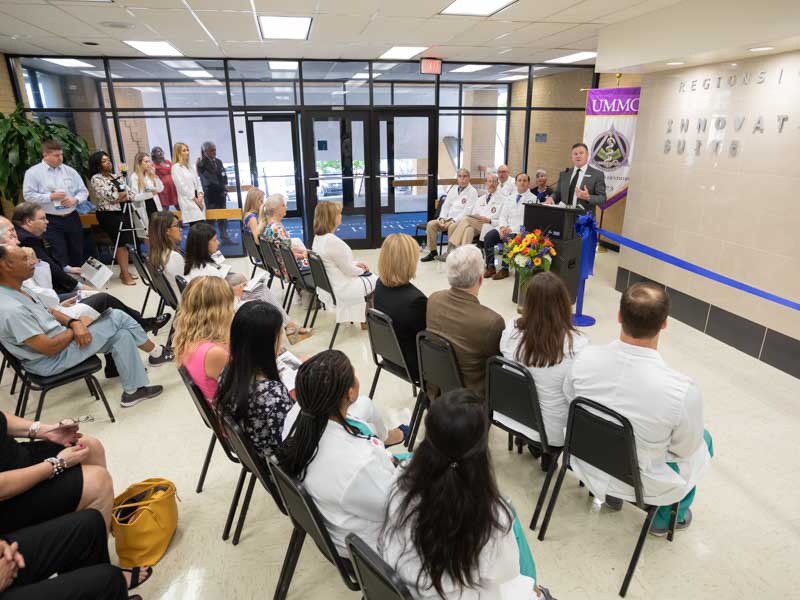
The center’s conference room houses a large screen where students and faculty can watch patients receive treatments in the operatory rooms in real time.
The clinic has been on the mind of Dr. Scott Phillips, associate dean of clinical affairs, for more than five years. He was persistent about it, presenting it to Felton when he came to the school as dean in 2016. Felton was enthusiastic about the idea, and while Phillips coordinated with CRET, Felton helped secure the funding to make the center a reality.
“We went from having one CT scan in the entire school that was limited and clunky, and now we have three – two of which are state of the art. It opens up opportunities we haven’t had before,” he said.
Phillips has stayed in touch with the two other CRET centers at the University of Missouri-Kansas City School of Dentistry and the West Virginia University School of Dentistry.
“We are learning from them so we can continue the CRET vision and mission,” said Phillips.
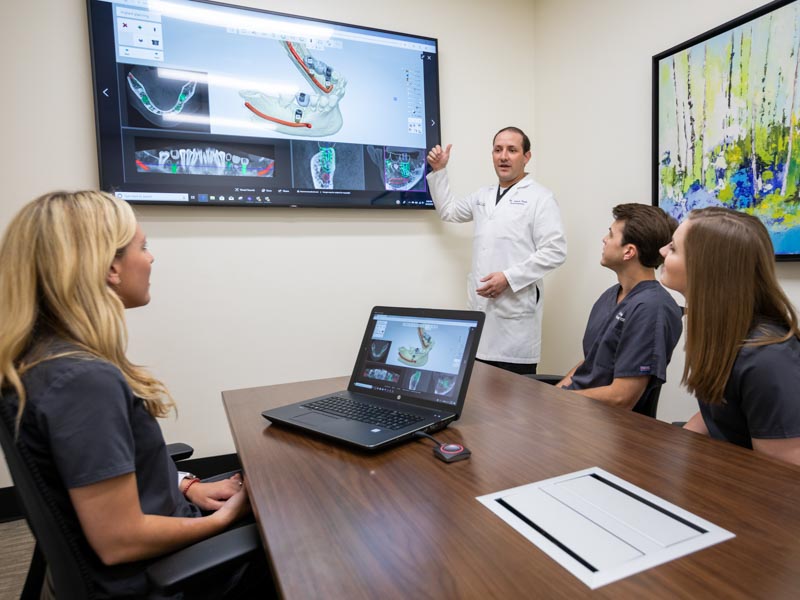
Dental students Collin Peterson of Gulfport, Erin Coggin of Madison and Heather Wise of Gulfport are excited to get started in the clinic.
“It’s going to broaden the horizon of procedures we can do and the number of cases we can see,” said Peterson. “Right now we’re limited on the supply and the technology we have, but now that we have all this, we can do a lot more advanced procedures.”
Dental students and attending faculty members will do rotations in the clinic throughout the year, with fourth-year students spending at least six weeks seeing patients there.
Not only will students be able to experience different kinds of equipment to better prepare them for life after school, they will also be able to treat patients in a way that more closely resembles what they will be doing as dentists.
“The students will be … doing comprehensive treatment. What that means is they will be treating their patients as if this was their own private practice,” explained Dr. Andres Pappa, director of the Regions CRET Innovation Suite and assistant professor of care planning and restorative sciences. “Upstairs (in the current clinics) they work by areas – one afternoon they are in prosthodontics and only working on prosthodontics. The next day, they’re in the endodontics clinic, only working on root canals, and so on.”
In the Innovation Suite, students, under the supervision of an attending faculty member, will get the opportunity to treat all of a patient’s needs.
Coggin is enthusiastic about the center’s digital capabilities, such as intraoral scanners that can be used to create a digital model of a patient’s mouth that is then printed using a 3-D printer.
Traditionally, making a model of a patient’s mouth takes hours in the lab and involves taking the impression, pouring it up with stone, trimming the stone and then drying it before presenting it to the patient.
“We spend a lot of time without our patients doing the work,” explained Coggin. “So (having that ability) and being able to pay closer attention to the patient and maximize efficiency will be great.”
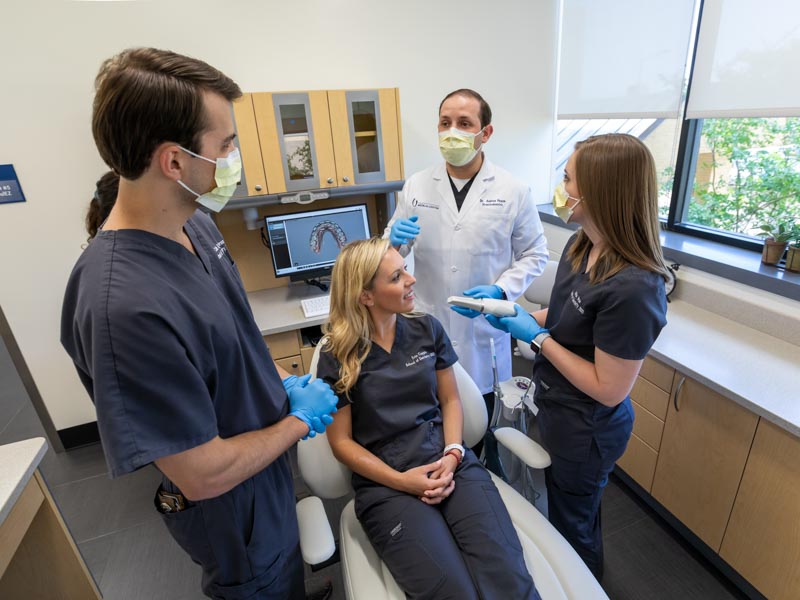
The digital capabilities of the technology center reflect the changing face of dentistry, better preparing students for the field in which they will practice.
“Dentistry is being transformed from an analog profession into a digital profession. Having access to digital intraoral scanners, 3-D printers and 3-dimensional radiology is going to be the biggest advantage of having this equipment here,” Pappa said. “It will put us at the forefront of modern dentistry as far as what we’re teaching our students.”
Wise sees benefits for the patients as well as for herself and her colleagues.
“Instead of them having to go upstairs and be in the big open bay, with tons of doctors walking by, this is a more private and intimate setting,” she said. “Maybe it can help lower their anxiety.”
Pappa, Felton and others at the School of Dentistry are well aware this unique opportunity would never have been possible without the support of CRET and Regions.
“We are so thankful to CRET and all of the member companies that have donated hundreds of thousands of dollars’ worth of equipment and supplies. Without them and the support from Regions, all of this would just be a dream,” said Pappa.


